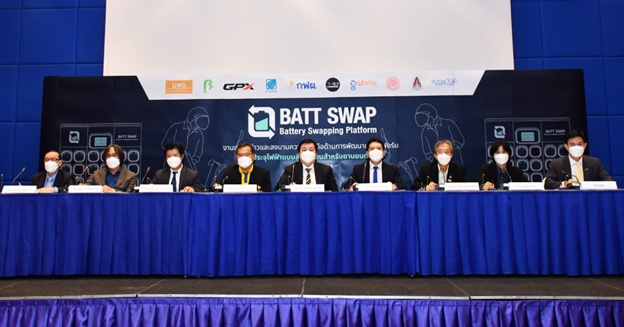An agreement signing ceremony was held on 15 December 2021 among nine organizations to embark on a joint project to develop a battery swapping platform for electric motorbikes. Members of this consortium include ENTEC-NSTDA, King Mongkut’s University of Technology Thonburi (KMUTT), Khon Kaen University, the Electricity Generating Authority of Thailand (EGAT), Beta Energy Solution Company Limited, GP Motor (Thailand) Company Limited, I-Motor Manufacturing Company Limited, Bangchak Corporation Public Company Limited and GridWhiz (Thailand) Company Limited, representing research and academic institutes, manufacturers of electric motorbikes and EV battery, smart grid solution provider and energy companies. The ceremony was presided over by Assoc. Prof. Dr. Thongchai Suwonsichon, Deputy Director of Program Management Unit for Competitiveness (PMU-C), the main sponsor of this project.

In its push to become a hub of EV production in ASEAN, the Thai Government has announced an EV roadmap aiming to have electric vehicles account for 30% of automotive production in Thailand by 2030. To enable Thailand to achieve carbon neutrality and become a regional EV production hub, NSTDA focuses its R&D effort in modern transport, the scope of which encompasses both EV and battery cell.
Motorcycles are the most common vehicle in Thailand with over 21 million motorcycles registered. The EV roadmap sets the targets of electric motorbike production to 360,000 units over the next four years and 675,000 units by 2030. This project aims to design a swapping battery system for EV motorbikes as a strategy to overcome the hurdle of recharging, which remains a significant challenge faced by electric vehicles. A swapping battery system will allow riders to swap a low-power battery for a fully charged one without waiting for hours to recharge. The scope of work consists of 1) defining a standard battery swapping platform for motorcycles with stakeholders, 2) designing and developing a standardized battery pack that will fit universally across motorbike types and brands as well as a standard charging station, 3) testing the prototypes and 4) formulating recommendations on industrial standards, regulations and business models for a battery swapping system.
The result of this project will support a policy to make Thailand a regional EV manufacturing hub, facilitate public adoption of EV motorbikes and lower the carbon footprint in transportation.
